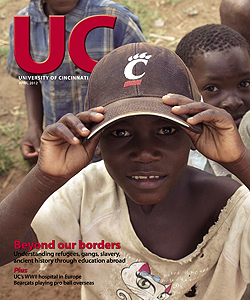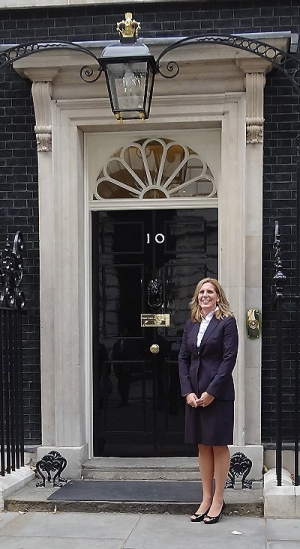by John Bach
Robin Engel couldn't resist the urge to leave a bit of evidence behind from her visit inside 10 Downing Street to meet British Prime Minister David Cameron.
Walking up the historic grand staircase, the University of Cincinnati criminal justice researcher admired portraits of past prime ministers as she wondered how many wars had started and ended at that very address.
"I turned the corner and bam, there is Winston Churchill's photo," she recounted to her Criminal Justice 101 class soon after her return from London. "I took my finger and I just tapped the corner of Churchill's photo. I wanted to leave one fingerprint in that place. It was such a deep and amazing feeling to be near that level of power."
As it turned out, Engel would leave far more than that single fingerprint behind in London. She also left them an innovative plan for helping the country curb gang violence. While inside 10 Downing, Engel was given a few moments face to face with Prime Minister Cameron in which she encouraged him to support the country's innovative police work, but her real impact came during the preceding days when she served as part of an international forum of experts on gangs.
Engel was invited to London by Britain's Home Secretary Theresa May in October 2011 to help officials better understand the root cause of widespread rioting, looting and arson that gripped several cities over four nights in August. She helped officials there come to the conclusion that gangs actually did not play a pivotal role in the unrest. Engel maintained, however, that Britain would benefit from implementing strategies she helped develop in Cincinnati and cities around the world for curbing gang violence.
Less than a month after the forum, British officials announced that they would spend $16 million to tackle gang violence by steering young people away from crime in 30 of the country's worst affected areas. The plan they are putting into place follows strategies similar to the Cincinnati Initiative to Reduce Violence (CIRV), which Engel spearheaded.
"We've sustained a 35 percent reduction in gang-related homicides in Cincinnati over three years," says Engel. "And now CIRV has caught on internationally."
CIRV targets the city's violent offenders with swift consequences, particularly for illegal drug and firearm possession, then CIRV offers a chance at reform through employment and education programs. In an effort to disassemble the city's most violent groups, CIRV calls on police, probation workers, community residents and others to confront gang members with a hard line on crime but also with a way out of the gang lifestyle.
The formula, Engel has proved, works around the globe as she is also working to establish similar models with police forces as far away as Glasgow, Scotland, and Adelaide, South Australia.

 Past Issues
Past Issues